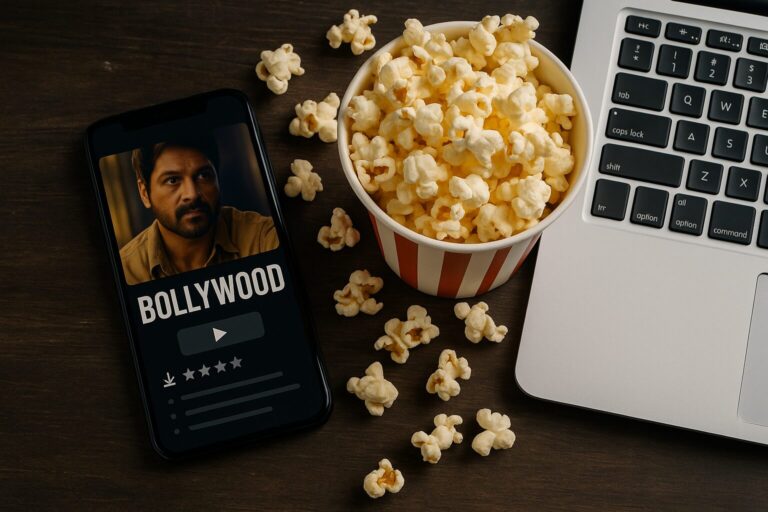You can tell a lot about someone by how they watch movies. Not just what they choose to stream, but how they get their hands on it in the first place. And if you ask around, quietly and off the record, you’ll find a particular group of moviegoers who’ve built their entire viewing habits around a big movie site called FilmyFly.
For the uninitiated, FilmyFly is one of dozens of so-called “pirate” sites that offer downloadable versions of the latest Bollywood (and often Hollywood) movies, usually within hours of their release. It’s not legal. But it’s everywhere. And it tells us something fascinating, not just about access, but about how people really think about ownership, creativity, and fairness in the digital age.
Here are six surprisingly consistent beliefs I’ve found among regular users of sites like FilmyFly. You might not agree with them. But if you want to understand the psychology of digital consumption in 2025, this is where it starts.
1. “If I Can’t Access It Legally, It’s Fair Game.”
This is the foundational belief. Most FilmyFly users aren’t trying to be rebels. They’re not driven by thrill or defiance. They’re frustrated customers. They see a film trailer, they get excited, they check their local streaming platforms, and it’s not there. Or it’s locked behind three different subscriptions. Or it won’t be available in their country for another six months.
In their minds, the system failed first.
So when someone downloads a 1080p rip of Jawan the day after release, they don’t see it as stealing. They see it as bypassing an unjust blockade. The logic is simple: “If you make it hard for me to be a paying customer, I’ll stop trying.”
This isn’t a new idea. But what’s striking is how morally neutral many downloaders feel about it. Not guilty. Not proud. Just… justified.
2. “Media Should Be a Shared Cultural Resource.”
A lot of FilmyFly users talk about movies the way people talk about public parks or libraries. Not in the literal sense, but in terms of cultural access. If a movie speaks to a common language, if it represents a shared identity, a region, a diaspora, then they feel it should be accessible by default.
“I just want to watch the films my parents grew up on,” some would say, referring to 90s Bollywood classics that are scattered across defunct DVDs and unavailable streaming rights. “Why is that behind a paywall?”
There’s an embedded collectivism in this view. The film industry wants to frame movies as property, bound by rights and licenses. But downloaders often see them as memory. As inheritance. As something no one should need to pay to relive.
3. “I’ll Pay for What I Truly Love, Eventually.”
Here’s the nuance. FilmyFly users aren’t against paying. In fact, many are also subscribers to Netflix, Prime Video, or Hotstar. What they want is the option to try before they buy.
Think of it like this: you download popular Bollywood movie like Azaad from FilmyFly.com. You watch it, maybe with friends, maybe three times. You fall in love. Then, when the merch drops, or the Blu-ray releases, or the theater brings it back for a rerun, you show up. You spend.
This belief maps closely to how indie musicians survive. Give away the digital stuff, make money on the vinyl, the hoodie, the concert. It’s not ideal for everyone. But for many consumers, it feels honest.
“I’ll pay for what deserves it,” is the common refrain. Not as a threat. As a principle.
4. “Studios Make Money Regardless, So What’s the Harm?”
This one’s trickier.
Some users justify downloading by pointing to the sheer scale of Bollywood’s box office economy. If a Shah Rukh Khan film makes ₹1,000 crore globally, does one downloaded copy really matter?
To them, piracy isn’t punching down. It’s punching sideways, redirecting revenue from faceless corporations to individual access. And while this belief conveniently ignores the financial realities for indie filmmakers, it reflects a deep skepticism of media conglomerates.
When you’re watching conglomerates gate content, shift release windows, or pull titles from streaming altogether (as Disney and others have done), you stop seeing them as partners in culture. You start seeing them as hoarders.
This isn’t an excuse. But it is a rationale.
5. “Curation Has Become Too Commercialized.”
FilmyFly users often feel alienated by the modern algorithm-driven entertainment world. They don’t want a homepage feed telling them what to watch. They want specific movies, on demand, without filler.
This is partly a rejection of streaming’s subscription fatigue. It’s also a form of cultural control. Many downloaders describe curating their own private archives, folders full of classics, comfort rewatches, rare imports, and fan edits.
It’s personal.
In that sense, FilmyFly functions less like a Netflix clone and more like a digital VHS library. Less “what’s trending” and more “what matters to me.”
This behavior aligns with a growing DIY ethos among young digital users, building their own media ecosystems, mistrusting third-party platforms, hosting Plex servers at home. Not because it’s more convenient. Because it’s more theirs.
6. “Gatekeeping Hurts Art More Than Piracy Does.”
This one surprised me.
Many users genuinely believe they’re helping films survive, especially older or niche ones, by keeping them in circulation. They’ll cite examples of Bollywood movies that disappeared from streaming and only exist now because someone, somewhere, ripped a DVD and uploaded it.
They see themselves as archivists. Guardians of media that the industry itself doesn’t seem interested in preserving. And there’s truth to that. Plenty of films are lost not to piracy, but to neglect. When rights lapse, tapes degrade, and no one notices, piracy sometimes becomes the only archive left.
In this worldview, gatekeeping isn’t just annoying. It’s actively harmful. It erodes access, memory, and discovery.
“If you love something, set it free,” they might say. Then they’ll add it to their download queue.
Final Thoughts: It’s Not Just About Free Movies
If you’re reading this expecting a moral verdict, you won’t find one here. Piracy isn’t clean. It raises valid concerns about compensation, intellectual property, and sustainability. But what’s clear is this: the people who rely on sites like FilmyFly aren’t just freeloaders.
They’re responding to a broken system. A system that hides culture behind region locks, pushes algorithmic sameness, and punishes curiosity with friction. Downloading becomes a way of pushing back.
What they want is simple: access, respect, autonomy.
And maybe, just maybe, they want to fall in love with movies on their terms. Not the studio’s.



